PHIL 2303
Sam Houston State University
Page 2 out of 16 results
Sort by
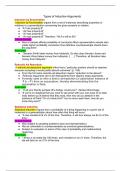
-
Unit 5 Types of Inductive Arguments
- Class notes • 2 pages • 2024
- Available in package deal
-
- $8.39
- + learn more
There are four types of inductive arguments: Induction by Enumeration, Reductio Ad Absurdum, Statistical Induction, and Higher-level Induction. Induction by Enumeration argues from specific instances to a generalization. Reductio Ad Absurdum argues against a position by showing it leads to absurd outcomes. Statistical Induction infers generalizations based on the probability of a thing happening. Higher-level Induction uses more general inferences to overrule lower-level ones. Examples are provi...
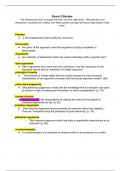
-
Exam 2 Review PHIL 2303
- Class notes • 4 pages • 2024
- Available in package deal
-
- $7.99
- + learn more
This text provides a review of concepts that may be encountered in Exam 2. It discusses the premise as a set of statements that justify the conclusion and the conclusion as the main point of the argument. Arguments are collections of statements used to justify a specific point, and sub-arguments can have multiple conclusions, serving as premises for larger arguments. The principle of charity suggests choosing the most favorable interpretation of an argument. Prima facie judgments are tentative a...
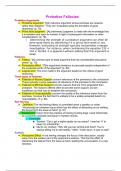
-
Chapter 4 Probative Fallacies
- Class notes • 9 pages • 2024
- Available in package deal
-
- $7.99
- + learn more
Probative argument is an inductive argument evaluated using the principles of good reasoning, as it uses reasons rather than statistics. The strength of a probative argument can be easily determined as weak or not based on prima facie judgment, which is a preliminary judgement made with the knowledge that it is tentative and open to revision. Determining the strength typically requires a deeper investigation. Probative fallacies are common types of weak arguments that have considerable persuasiv...

-
Chapter 3 (arguments)
- Class notes • 5 pages • 2024
- Available in package deal
-
- $7.99
- + learn more
Arguments are collections of statements that are used to logically support a specific point. They consist of premises, which justify the conclusion, and the logical form that connects the premises to the conclusion. Premises and conclusions are statements that are declarative in grammatical form, factual, and in principle verifiable. Certain words or phrases, known as "tell words," can be used to identify whether a statement is a premise or a conclusion. Common tell words include "therefor...
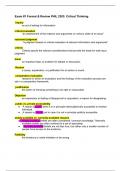
-
Exam #1 Format & Review PHIL 2303: Critical Thinking
- Summary • 3 pages • 2024
- Available in package deal
-
- $7.99
- + learn more
Exam #1 for PHIL 2303: Critical Thinking will include questions on various topics such as inquiry, critical evaluation, reasoned judgment, criteria, issues, reasons, comparative evaluation, justification, objections, public vs. private accessibility, widely-available vs. narrowly-available reasons, fallibility, fallacy, bias, counterexamples, context, state of practice, autonomy, confirmation bias, curiosity, open-mindedness, fair-mindedness, respect for reason, factual judgments, evaluative jud...
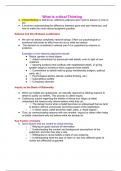
-
Chapters 1,2 (what is critical thinking, The nature of inquiry, The guidlines of inquire)
- Class notes • 5 pages • 2024
-
- $7.99
- + learn more
Critical thinking refers to reflective judgment on what to believe or how to act. It involves recognizing good and bad reasoning and making rational judgments based on evidence. While our psychological and emotional side can influence our beliefs and actions, a rational decision is supported by reasons or evidence. Non-rational judgments include biases, commitment to existing beliefs despite new evidence, ignoring conflicting evidence, and relying on beliefs held by a group or psychological fact...

Study stress? For sellers on Stuvia, these are actually golden times. KA-CHING! Earn from your study resources too and start uploading now. Discover all about earning on Stuvia


